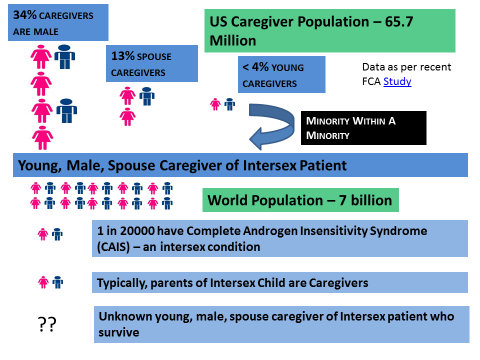 If you are reading this, you should ask yourself what is marriage? The fundamental building block of any marriage is trust and love. Compassion, family, children, home, in-laws, BBQs, parties, socializing, vacations, etc. come later. The marriage vows that we all recite has sentences like “till death do us apart” or “in sickness and in health” all of which are great sounding. How many stick around to test these vows? Statistically, 50% of marriages end up in divorce for whatever reason. As per a recent study by Fred Hutchison Cancer Research Center, women are 6 times more likely to be divorced or separated when diagnosed with a major illness. This begs the question should intersex patients have sex reassignment surgery (SRS) and hormone replacement therapy (HRT) during a marriage? There are bioethics issues that need to be dealt with in an intersex marriage.
If you are reading this, you should ask yourself what is marriage? The fundamental building block of any marriage is trust and love. Compassion, family, children, home, in-laws, BBQs, parties, socializing, vacations, etc. come later. The marriage vows that we all recite has sentences like “till death do us apart” or “in sickness and in health” all of which are great sounding. How many stick around to test these vows? Statistically, 50% of marriages end up in divorce for whatever reason. As per a recent study by Fred Hutchison Cancer Research Center, women are 6 times more likely to be divorced or separated when diagnosed with a major illness. This begs the question should intersex patients have sex reassignment surgery (SRS) and hormone replacement therapy (HRT) during a marriage? There are bioethics issues that need to be dealt with in an intersex marriage.
Intersex Marriage
Unfortunately, intersex has been dealt with lot of secrecy and stigma. As a result, an intersex person already finds it difficult to find a person who is compassionate and loving to marry with. Hopefully, the future will be different by raising awareness and education. The flip side is half-truths and to not disclose the intersex condition to the future spouse. This approach is a BIG no-no in any marriage because marriages are built on trust and love. As a married couple, they also want to have children. Adoption is the most common option but what if it is not possible. The next choice is to look into fertility options. As they begin their quest for fertility options, a doctor reveals the intersex condition and advises sex reassignment surgery followed by hormone replacement therapy. It is likely the couple is young in late 20s or 30s. Neither of them having much clue about effects of the treatment. Is there any medical data or scientific basis to have the sex reassignment surgery and therapy for an intersex patient while in your 20s or 30s? Do the benefits outweigh the risks during a marriage?
Spouse Caregiver of Intersex
An intersex marriage is fragile. Typically, parents are caregivers of intersex patients when they have sex reassignment surgery and go on hormone replacement therapy. Parents also have access to medical resources and information and support groups of their own to help and guide them through the process. Due to privacy laws, spousal caregivers of intersex patients do not have the same access. The spouses are left out. Worse, the spouse has no resources or information for their own support and help. The intersex condition is traumatic for the patient. What about the spousal caregiver who is left in the dark. Is there trauma? The spouse has to withstand all the issues that come along with the medical treatment but there is no feedback mechanism. Because of privacy, the spouse is not allowed to go to the doctor visits for the intersex patients. How does the doctor get a complete assessment of the therapeutic treatment? Hormone Replacement Therapy is NOT an exact science. Multiple factors are evaluated to arrive at the correct dosage for each individual. Without a 360 degree view of all the people involved in the patient care, how can one medically and scientifically arrive at the right therapeutic solution? Had there been parental caregivers of intersex patient, they would be allowed to participate in the feedback mechanism. So why is the spouse of an intersex patient being discriminated against? That is an oxymoronic statement, isn’t it? In a first-of-its-kind case, a law suit was filed by the parents of an intersex child where a sex assignment surgery was performed on an intersex infant child without their consent. Does the spouse of an intersex person who did the sex reassginment surgery (SRS) during a marriage have EQUAL rights?
Best Interest of Intersex Patient
Everyone deserves to be happy. The best interest of the intersex person is to be happy. If they have found a spouse who is happy with the intersex person, then why bother? The doctor’s best interest is the well-being of the patient. If the medical system chooses to do the sex reassignment surgery during a marriage then they should make it an inclusive approach for the spouse. The spouse also has some of the same symptoms including but not limited to trauma, infertility, secrecy, stigma and dealing with the sex reassignment surgery and hormone replacement therapy as a caregiver. It would be good to see medical data or a scientific basis to show benefits of doing sex reassignment surgery and hormone replacement therapy in 20s or 30s. There are several intersex patients who have lived well into 60s, 70s and died of natural deaths without having had sex reassignment surgery or hormone replacement therapy. If it aint broke, don’t fix it. By introducing new challenges of testing the marriage vows, the already frail marriage of an intersex couple is tested to no limits. Further, the doctor who reveals the intersex diagnosis to a couple has no idea whether it is information which has been shared with the non-intersex spouse? What if there was fraud in a marriage. Now the medical system is just compounding the marital issues and for their patient.
There are several first-hand accounts by intersex patients who have widely rejected the surgery. They either prefer to wait or never have it done. Regardless, they want it to be “their” decision and not the doctor. If a heart surgeon does triple by-pass surgery, they document it as such on medical record. If a neurosurgeon does traumatic brain injury surgery, they document it as such on medical record. Why is intersex surgery NOT documented similarly with facts? Apart from stigma, maybe there is something about the controversial treatment which is medically not acceptable? All we are asking for is the truth.
Even the most compassionate and loving spouse may finally end the marriage. Potentially dealing a devastating effect on the intersex patient. Do the benefits justify the risks of happiness? After all, isn’t the purpose of the medical treatment to give a healthier life for the intersex patient and ultimately happiness?





 Facebook
Facebook GooglePlus
GooglePlus RSS
RSS Twitter
Twitter